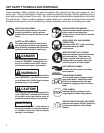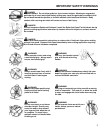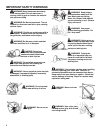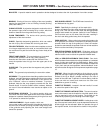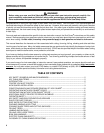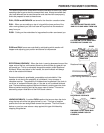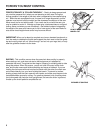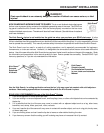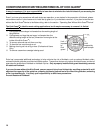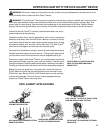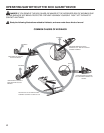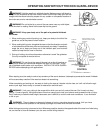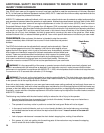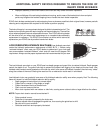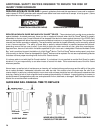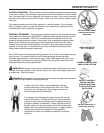
10
CONDITIONS WHICH MAY REQUIRE REMOVAL OF KICK GUARD
®
In any circumstance, it is your responsibility to learn how to minimize the risk of kickback if you are using the
saw without the Kick Guard in place.
Even if you have prior experience with safe chain saw operation, or are trained in the prevention of kickback, please
use extreme caution if you choose not to install the tip guard, or if you decide to remove it. If you plan to use the saw
without the Kick Guard
®
device to facilitate cutting, refer to the section “Operating Saw Without Kick Guard
®
Device”.
The Kick Guard
®
is ideal for most cutting applications, but it may be necessary to remove it in limited
situations such as:
1. Felling trees that are larger in diameter than the working length of
the guide bar.
2. Cutting trees and logs that are larger in diameter than the
effective cutting length of the bar (dimension from engine to the
inside of the Kick Guard
®
).
3. To remove a bound saw out from a cut log.
4. To draw the bar nose through a cut.
5. Making a boring cut into a log or tree. (Professional Users
Only)
6. To remove a saw when a wedge is being used.
Limit
imposed
by
kick
guard
Limit
imposed by
saw bumper
MAXIMUM
Echo has incorporated additional technology to help minimize the risk of kickback, such as reduced kickback chain,
reduced kickback guide bar, and the chain brake system. These other devices only reduce kick back forces, and do not
guarantee the prevention of kickback or kickback injuries. Only a properly installed kick guard absolutely prevents
all rotational kick back.
If you use the saw without the Kick Guard, you can prevent injury from kickback by: avoiding contact with solid
objects at the upper tip of the guide bar; properly positioning yourself out of the line of the guide bar; and using
a firm, two-handed grip. It is solely your responsibility to take these precautions.
Prevent Rotational Kickback!
DIAMETER



